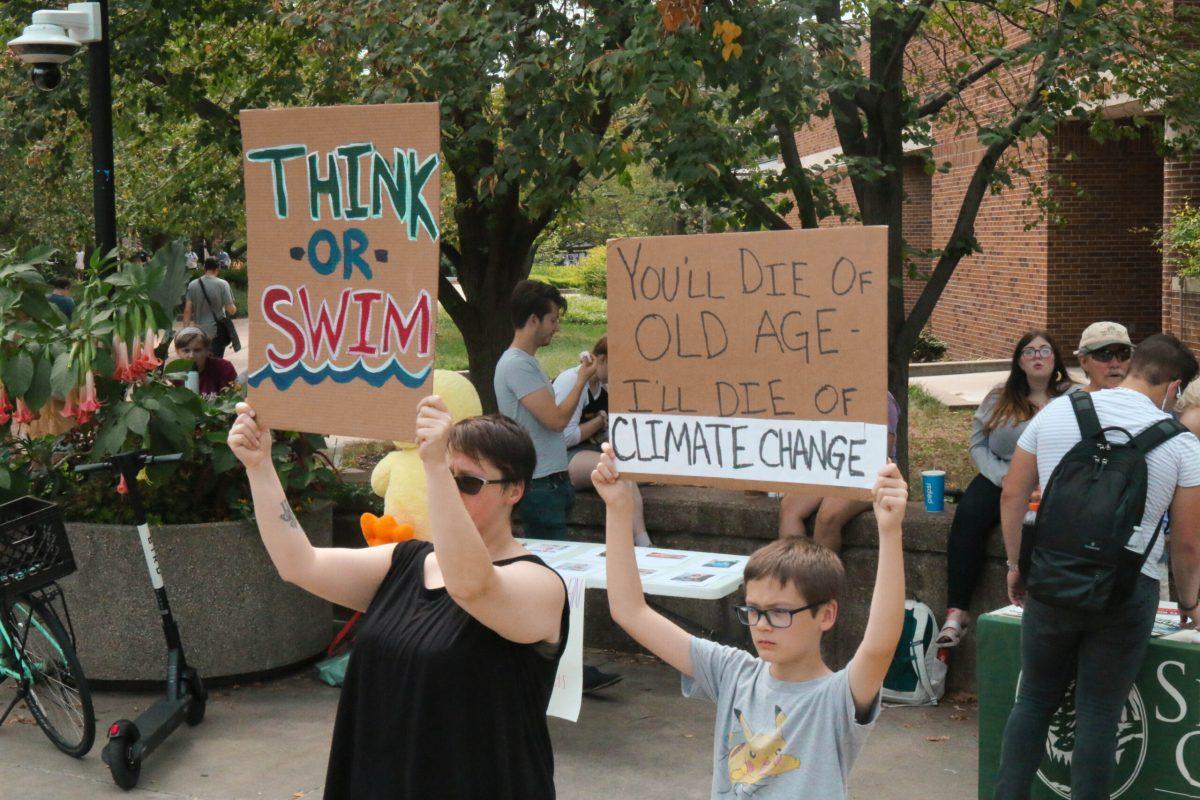
On Sept. 20, students and community members gathered in Speakers Circle to demand action on climate change from world leaders. This was part of a worldwide series of climate-related events called the Global Climate Strike, spurred by activist Greta Thunberg.
The event was organized by Sunrise Movement CoMo and Climate Leaders at Mizzou. Barb Kuensting, a sophomore biology and journalism major, is the president of Climate Leaders at Mizzou and played a major role in organizing the event.
“I’ve always been passionate [about environmental issues],” Kuensting said. “I remember reading about the Amazon rainforest in fifth grade and telling all my friends about how important it was to the world. From there, it really took off.”
Kuensting was involved with Climate Leaders at Mizzou during her freshman year. However, after many of the members graduated, she decided to rebrand and revitalize the organization along with others.
Aside from organizing protests, the group is also heavily involved in directly educating community members about climate change. They do this through hosting documentary screenings and presentations.
Though, Kuensting said the event in Speakers Circle was by far the most impressive one she helped organize, having drawn 400 community members.
“It was singlehandedly the biggest environmental event Columbia has ever seen,” she said.
Kuensting emphasized that while individual lifestyle changes are valuable, it’s most important to understand the larger structural issues that allow climate change to persist.
“Climate Leaders at Mizzou focuses more on dismantling the systems that are actually making climate change as big of a problem as it is,” she said. “You’re not destroying the Earth by using a plastic straw. It’s the corporations that are putting billions of gallons of oil into the ocean and carbon dioxide into the atmosphere.”
Neil Fox, a professor of atmospheric science, said he hopes that MU’s own climate protest, along with the Global Climate Strike as a whole, is an indication that people are beginning to realize that climate change is a dire issue.
“Maybe politicians will say, ‘okay, this is something that can gain me votes so I should make it part of my platform,’” Fox said. “So maybe this is the sort of massive movement that we need.”
Fox said he thinks Earth’s recent natural disasters will also hopefully play a role in increasing people’s awareness of the threat of climate change.
“I think the wildfires in California in particular [can increase awareness],” he said. “It’s easy to link droughts to wildfires. When you think of climate change you think of the Earth getting hotter and things drying out. People see it as a clear indication that something is changing.”
Anthony Lupo, professor of atmospheric science, said that climate change has not historically been a prominent issue to most people, perhaps because of the fact that it’s a long-term issue.
“Most people don’t think 20 or 30 years down the road, most people are worried about where their next paycheck is coming from or what’s going to happen next year or the year after,” Lupo said. “In survey after survey, people have climate change way down on the list of things to be concerned about.”
Lupo said that students who are passionate about the issue should directly correspond with lawmakers as a way to get them to listen.
But altogether, Lupo said, the most important thing students should do is educate themselves.
“You don’t even have to take a class on it,” he said. “There’s a lot of good resources out there on the internet. Get educated and informed about it, regardless of your point of view.”
_Edited by Ben Scott | [email protected]_